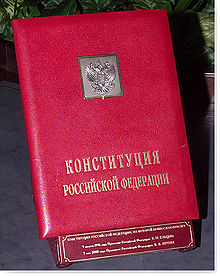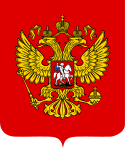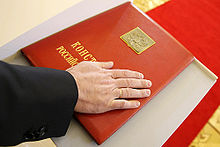- Constitution of Russia
-
Constitution of Russia 
Presidential copy of the Constitution.Ratified 12 December 1993 Signatories Citizens of Russia - For the constitution of the Imperial Russia, see Russian Constitution of 1906
Russia 
This article is part of the series:
Politics and government of
RussiaConstitution- Russian Constitution of 1906
- Russian Constitution of 1918
- 1924 Soviet Constitution
- 1936 Soviet Constitution
- 1977 Soviet Constitution
- Russian Constitution of 1978
- Constitution of Russia 1993
Legislature- Prime Minister
- First Deputy Prime Minister
- Constitutional Court
- Supreme Court
- Supreme Court of Arbitration
- Legal system
- President
- Parliament
- Referendums
- Central Election Commission
- Political parties
The current Constitution of the Russian Federation (Russian: Конституция Российской Федерации; pronounced [kənsʲtʲɪˈtutsɨjə rɐˈsʲijskəj fʲɪdʲɪˈratsɨɪ]) was adopted by national referendum on 12 December 1993. Russia's constitution came into force on 25 December 1993, at the moment of its official publication. It replaced the previous Soviet-era Constitution of 12 April 1978 of Russian Soviet Federative Socialist Republic following the 1993 Russian constitutional crisis.
Of all registered voters, 58,187,755 people (or 54.8%) participated in the referendum. Of those, 32,937,630 people (54.5%) voted for adoption of the Constitution.[1]
Contents
Declaration of adoption
 Dmitry Medvedev takes the presidential oath with his hand resting on the Constitution, 7 May 2008.
Dmitry Medvedev takes the presidential oath with his hand resting on the Constitution, 7 May 2008.
"We, the multinational people of the Russian Federation, united by a common fate on our land, establishing human rights and freedoms, civic peace and accord, preserving the historically established state unity, proceeding from the universally recognized principles of equality and self-determination of peoples, revering the memory of ancestors who have conveyed to us the love for the Motherland, belief in the good and justice, reviving the sovereign statehood of Russia and asserting the firmness of its democratic base, striving to ensure the well-being and prosperity of Russia, proceeding from the responsibility for our Motherland before the present and future generations, recognizing ourselves as part of the world community, adopt the Constitution of the Russian Federation."
Structure
The constitution is divided into two sections.
Section One
- Fundamentals of the Constitutional System
- Rights and Liberties of Man and Citizen
- Federative system
- President of the Russian Federation
- Federal Assembly
- Government of the Russian Federation
- Judiciary
- Local Self-Government
- Constitutional Amendments and Revisions
Section Two
- Concluding and Transitional Provisions
Overview
The Russian Constitution has entrenched world standarts for human rights and basic principles of democratic state-building such as ideological neutrality of the state, political pluralism, competitive elections and seperation of powers. The constitution establishes a super-presidential system, resembling the French system but with stronger executive power due to the increased independence of the president in comparison to the French model.[2]
Presidential powers
The President of the Russian Federation holds primary power in the Russian government system. The President who is elected fpr a six year term, is the head of state and the Supreme Commander in Chief.[3] He determines "guidlines for the domestic and foreign policy of the state". Although the President may preside over Government meetings, he is not the head of the Russian Government. As the head of the state the President appoints the members of the Government and directs it's activities. While in general the presidential "direction" of the activities of the Government is limitied to establishing guidlines, under the 1997 Constitutional Law on the Government the President has a special authority over ministries dealing with defense, security, internal and foreign affairs.
Legislative Branch
Internal checks and balances within the legislative power work through the procedure of the Federation Council's reviewing of the laws adopted by the State Duma and giving it's consent to them. In the case of the bill rejection by the Federation Council, the State Duma in it's turn may override the rejection by a two thirds vote. The legislative branch may check the presidential power of the Russian Federation through hearing the addresses of the President by both houses of the Federal Assembly; giving approval to the decree of the president on the introduction of martial law and state of emergency; granting consent to the president for the appointment of the chairman of the government, the chairman of the Central Bank, the Procourator General, members of the Constitutional Court, Supreme Court and more.
See also
- Institute of State and Law
- Russia
- Law of the Russian Federation
- Constitution of the Soviet Union
- 2008 Amendments to the Constitution of Russia
- Constitutional economics
- Constitutionalism
References
- ^ Constitution of Russia: nature, evolution, modernity 1.4.2 National character. (Russian)
- ^ Andrea Chandler, "Presidential Veto Power in Post Communist Russia, 1994-1998", Canadian Journal of Political Science
- ^ Articles 80 (1), 81 (1), 87 (1) of the Constitution of Russia
External links
- The Russian Constitution, with the original Russian text and translated to English, German (Deutsch) and French (Français)
- In Russian – The Constitution on the official Russian Government's website
- English translation of the constitution, on the website of Russian Embassy to the United States
- Information about the Russian Constitution
Constitutions of Russia and the Soviet Union Constitutions of Russia Constitutions of the Soviet Union Constitutions of Europe Sovereign
states- Albania
- Andorra
- Armenia
- Austria
- Azerbaijan
- Belarus
- Belgium
- Bosnia and Herzegovina
- Bulgaria
- Croatia
- Cyprus
- Czech Republic
- Denmark
- Estonia
- Finland
- France
- Georgia
- Germany
- Greece
- Hungary
- Iceland
- Ireland
- Italy
- Kazakhstan
- Latvia
- Liechtenstein
- Lithuania
- Luxembourg
- Macedonia
- Malta
- Moldova
- Monaco
- Montenegro
- Netherlands
- Norway
- Poland
- Portugal
- Romania
- Russia
- San Marino
- Serbia
- Slovakia
- Slovenia
- Spain
- Sweden
- Switzerland
- Turkey
- Ukraine
- United Kingdom
- Vatican City
States with limited
recognition- Abkhazia
- Kosovo
- Nagorno-Karabakh
- Northern Cyprus
- South Ossetia
- Transnistria
Dependencies
and other territoriesOther entities - European Union
- Sovereign Military Order of Malta
States with limited
recognitionDependencies and
other territories- Christmas Island
- Cocos (Keeling) Islands
- Hong Kong
- Macau
Categories:- Constitutions of Russia
- 1993 in law
Wikimedia Foundation. 2010.

